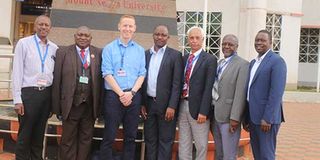How Mount Kenya University is raising its global profile

From left: Dr Joseph Wanjohi (Coordinator of Surgical Training at Thika Level 5 Hospital), Prof King David Yawe (President of West African College of Surgeons), David Cunningham (Chief Executive Officer kidsOR (UK)), Dr Evans Mwiti (Deputy Vice Chancellor, Mount Kenya University), Prof Pankaj President (College of Surgeons, East Central and Southern Africa (COSECSA)), Dr Josphat Njuguna (Principal, College of Health Sciences, Mount Kenya University and Dr Peter Arimi.
Mount Kenya University (MKU) is among the East African universities that are busy deepening strategic ties with both regional and international partners. These partnerships are significantly enhancing the university’s capacity to deliver on its teaching, research and community outreach mandates.
Additionally, such partnerships are raising the university’s global profile.
For example, on March 11, Makerere University, together with North Carolina State University (NC State), USA, convened the East African Higher Education Summit in Kampala, Uganda.
The summit was held under the theme, “Building Communities’ Resilience”.
HIGHER EDUCATION STRATEGIES
It sought to develop strategies to strengthen higher education in the region, and ultimately led to the partnership between Makerere and NC State, established in 2015, being expanded to include MKU (Kenya), Gulu University (Uganda) and Mbarara University of Science and Technology (Uganda).
The universities discussed how to transform higher education to support research and economic development.
The vice-chancellors and senior university officials shared thoughts on regional capacity building in higher education through partnerships.
The participants explored implementation frameworks at the regional level.
BUILD CAPACITY
In a joint communiqué, the vice-chancellors of the collaborating universities committed to build capacity and pursue excellence in research, teaching and scholarship.
They promised to increase the mobility of staff and students and strengthen regional level training.
They underscored the importance of multilateral collaboration as an instrument to address current and future global challenges, namely food security, climate change, public health through community engagement and other areas of mutual interest.
In the communiqué, they declared: “As research-intensive universities, we have a collective responsibility to strengthen research that impacts on policy and practice.”
GRADUATE TRAINING
The universities agreed to jointly increase cooperation on research and graduate training at PhD level.
On January 14, MKU signed a memorandum of understanding (MoU) with Makerere. The two parties agreed to promote joint research, teaching and learning and student and staff exchanges.
The two parties will also share experiences in developing better teaching methods and techniques. They plan to organise joint symposia, workshops and conferences.
They will also organise joint research programmes and projects, as well as publications and documentation. They will share and exchange information.
JOINT RESEARCH
The Makerere-MKU MoU is being implemented through a $100,000 project on joint research. Thirteen recipients of MKU-Makerere colleges of health sciences grant got the first disbursement mid last year. To date, the projects are under implementation by teams composed of staff and students drawn from both institutions.
The grant has sponsored the researchers to visit each other to jointly execute projects in the area of cancer, TB, antibiotics resistance, tungiasis and public health.
The agreement between the two universities is a natural progression of ties cultivated way back in 2017. That year, the MKU College of Health Sciences (MKU-CHS) and Makerere College of Health Sciences (Makerere-CHS) signed an MoU stating how they would collaborate to improve higher education in the region.
The MoU says the two colleges “will work together as equal partners” to meet this objective “through development of exchange programmes for both students and faculty, and joint teaching and research.”
The document lists the three goals that the collaboration will target.
TWINNED CURRICULUM
Besides exchange programmes, the colleges will develop twinned curriculum, thus enhancing the educational quality and resources of both parties.
Another goal is to share information on academic programmes of both colleges so that students take full advantage of existing international education opportunities.
Thirdly, the document proposes the creation of a collaborative relationship between Makerere-CHS and MKU-CHS, in which either party will recognise the other as a partner in training and research.
UK UNIVERSITIES
MKU also has opportunities to nurture ties with United Kingdom (UK) universities. A twinning arrangement organised by Kenya’s High Commission in the UK brings together universities from both nations and creates the opportunity to share curricula.
The meeting, organised by Kenya’s education attaché, Ms Dorothy Kamwilu, attracted several UK and Kenyan universities. MKU was represented by Deputy Vice-Chancellor, Academic and Research Affairs, Dr Bibianne Waiganjo-Aidi, accompanied by Dean, School of Pure and Applied Sciences, Dr Mary Muriuki.
Kenyan High Commissioner to the UK Manoah Esipisu said the twinning arrangement “will be about working to build a new professional academic cadre. Its work is to support young people to grow professionally.”
He added that the VCs “can now use their association for structured engagement.”

